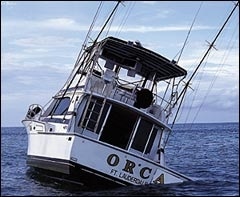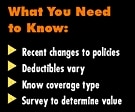
Every year when hurricane season arrives, fishermen along the East Coast experience an acute and renewed interest in their boat-owner’sinsurance policy. Some discover, much to their dismay, that theyhave less coverage than they thought they had, or the wrong typeof coverage. Of course, lots of people find that out the hardway, after they’ve experienced a loss.
I heard a story recentlyabout a fellow who, after buying a policy, decided to actuallyread it. There on the declarations page, in black and white, wasa statement saying that in the event of a hurricane his boat had to be pulled from the water and blocked up in a boat yard,or else there was no coverage for damage due to the storm. That’sa big issue, because with a hurricane approaching there mightnot be time or space for hauling a boat.
As with any other kindof insurance, it’s vitally important to take the time and have your agent spell out all conditions of the boatpolicy in great detail. And since the overwhelming devastationwreaked upon boats by hurricanes such as Hugo and Andrew, therehave been some subtle but important changes in the way boat policiesare provided by the major insurers.
One reaction was thatgood policies simply became more difficult to get. Some major insurers got out of the boat business (notto mention the homeowner’s business) after Andrew, but as timeheals all wounds, many of them have cautiously reentered the marinemarket. It’s simply too big and too lucrative a market to ignore forever. Prices went up substantially, but increased competition has leveled that offsomewhat. The majority of companies still selling marine insurancehave merely added some additional conditions to their policies.
Watch the Deductibles
Captain Tim Nettles isa former marine electronics salesman and charter boat captainwho now runs an Allstate agency in Palm Beach Gardens, Florida,(800) 562-8145. He is extremely knowledgeable about boat insuranceissues, and told us that most of the changes in policies concern deductibles.
“Some companies,including Allstate, use flat deductibles, such as $100, $250,$500, $1,000, or $2,500,” Tim says. “Other companiesuse a percentage deductible of one, two, three, five, or evenas high as ten per cent of the insured value of the vessel. SinceHurricane Andrew, some companies even include a separate deductiblefor wind or hurricane damage, usually a percentage deductiblethat is higher than the standard deductible.” Tim adds that since Andrew, Allstatehas added a $250,000 maximum value to its boat policies in thestate of Florida.
It goes without sayingthat you should go over your policy carefully with your agentuntil you’re clear about everything. Insurance companies are understandablygun-shy in light of recent hurricanes, and have tightened therules to protect themselves. But changes in deductibles and windstormcoverage are only two things of which a boat owner must be aware.
Know Your Coverage Area

Coverage area is a critical issue. Some companies use navigational boundaries, just as theCoast Guard does on a captain’s license, while others use latitude/longitude parameters. Others simply include all of thecoastal waters of the continental U.S. and Canada out to 100 milesoffshore. Boundaries need to be clearly defined and adhered to.
Then there’s the issueof foreign travel. Lots of captains take their boats to the Bahamaseach year, but most companies require a special rider (at extracost) that extends the coverage to include the islands. And ifyou travel to Central America or the Caribbean you will need topurchase extra coverage, as well. Don’t assume that your policyautomatically covers you wherever you go.
Cuba is a good example.Quite a few private boats now regularly travel back and forthfrom South Florida to Cuba, but we know of no insurance companieswho will bind a boat travelling in Cuban waters. Skippers whomake that journey are therefore doing so uninsured.
What About Gear?
It also pays to ask detailedquestions regarding tackle and accessories. Tim Nettles says Allstatecovers portable items under a Boating Accessory coverage, whichis up to ten percent of the hull and engine coverage. Things likelines, fenders, gaffs, and life preservers would fall into thiscategory, but electronics could go either way. It all depends on whether they are permanently attached.
The general rule of thumbis if it takes tools to remove it, as in the case of flush-mountedelectronics, it’s considered permanently attached and is thereforeadded to the hull coverage. But if the piece of electronics inquestion is bracket-mounted and can be easily removed, it wouldprobably be covered under the “accessories” portionof the policy. If you have lots of expensive electronics mounted in removable fashion, you mightnot have enough coverage to replace them.
Then there’s tackle.Lots of us have a great deal of money tied up in tackle, but it’s not generallycovered by a boat policy. You need to discuss how it’s coveredwith both your boat insurance agent and your homeowner’s agent(hopefully they are one and the same), because in certain typesof losses, homeowner’s insurance will cover tackle.
“With our policyyou can buy a coverage called Personal Effects that extends coverage to personalitems not covered under the boat policy, but with the same perils the boat policy covers,” says Nettles. That’s an important distinction, because boat policies and homeowner’spolicies do not always cover the same things.
Here’s an example: Sayyou have loaded your boat for a trip to the Bahamas, with everyrod and reel you own aboard, plus lots of other personal gear.Half way across the Gulf Stream, a through-hull fitting lets goand the boat sinks. The hull would be covered, but probably notall of your gear, un less you bought extra coverage to includeit.
Why wouldn’t your homeowner’sinsurance cover the loss? Nettles says he has never seen a homeowner’spolicy that covers loss due to sinking. The ironic part is thatif your boat sank after catching fire, your homeowner’s policyprobably would pay for your personal stuff because the loss wasdue to fire. Ask these types of questions of your agent, becausethousands of dollars worth of tackle and gear are no small concern.Consider all possible catastrophes when purchasing coverage.
Named Peril Vs. Named Exclusion
Perhaps the most importantaspect of your boat policy concerns what type of coverage you’reactually buying. Most policies are either Named Peril or NamedExclusion. The former covers only the specific perils named within,such as fire, theft, and sinking. The latter covers everything_except _the perils it specifically excludes. Named Exclusionpolicies generally offer broader coverage. Whichever type youconsider, read the declarations carefully before you sign.
You also must choosebetween Actual Cash Value and Agreed Value policies. These conceptsbasically only relate to total losses, but are significant. With an Actual Cash Value policy, in the event ofa total loss you get what the boat was worth at the time. Sayyou buy a brand-new boat for $50,000 and buy an ACV policy forthat amount. A year later the boat sinks and you find that, dueto depreciation, it was only worth $40,000. That’s what you’dreceive.
In the same scenariowith an Agreed Value policy, you would have received the full$50,000. Whatever value you and the company agree upon, determinedby a survey of used boats, that’s what your coverage remains. Insurance companieswill usually require additional surveys in subsequent years withsuch coverage, to determine the vessel’s current value.
In the event of partialloss, though, all parts are typically depreciated. Say you ownan outboard boat with two-year-old engines and you strike a submerged object, destroying both lower units. You will be compensatedfor what two-year-old lower units are worth with either type ofpolicy. But once again, you can buy additional coverage (are youstarting to notice a pattern here?) to defray depreciation ona claim. Allstate calls its policy the Repair Cost Option, andit eliminates depreciation on a partial loss claim.
None of us like to thinkabout our beloved boats suffering damage or loss. Somehow it seemsmuch more horrifying than losing something like a car. But inthe real world, stuff happens, so you’d better be prepared. Bythinking critically and realistically about all the differenttypes of losses you could potentially suffer at sea, you and yourinsurance agent can make sure you are adequately covered.
Boat Insurance Sources
- Allstate, (847) 402-5000
- Blackadar, (800) 292-0092
- BOAT/US, (800) 283-2883
- Charter Lakes (charter & party boats), (800) 879-2248
- Main Insurance, (800) 763-0895
- Progressive, (888) BOAT-PRO
- West Marine, (800) 538-0775
¿









